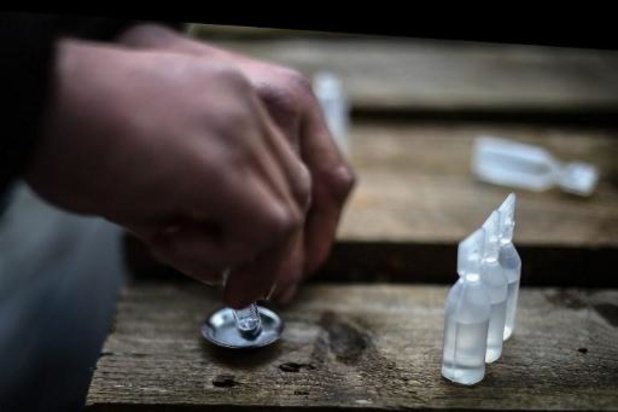The first "risk reduction user space" for drug users - also called fixing rooms - in Brussels, called Gate, will open in Brussels in December 2021, announced the mayor of the City of Brussels Philippe Close in a press release on Tuesday.
Like all big cities in Europe, the City of Brussels also has places where drugs are used openly, which is a major concern for the authorities as well as the people of Brussels, the press release states.
This situation is not liveable for the inhabitants of the neighbourhoods, nor for the addicts, but the current Covid-19 crisis has only exacerbated this development, which is why the user space will open.
"Currently, the most vulnerable in society - in many cases homeless people, people living in exclusion or precarious conditions - have no other possibility to use their drugs than in public spaces," a press release reads.
"The risk-reducing userspace will provide a concrete and effective solution to these situations," it added.
Worldwide, about 100 of these spaces already exist, including in all of Belgium's neighbouring countries, and one in the city of Liège.
During its first 16 months of operation, the Liège facility prevented 21,000 instances of public drug use in the city. Additionally, after such a space opened in Rotterdam, 83% fewer syringes were found on the street. No increase in crime was observed in the area.
A stepping stone to assistance
"The new Brussels users' space, called Gate, will serve as a 'bridge' or stepping stone to care and assistance, and symbolises well-being, safety, security and the transition from a life on the streets to one in a framework," the press release states.
The development of such a project requires close cooperation between all actors and levels of government involved in the chains of prevention, care and security, and which ensure social cohesion, the authorities stressed.
The City of Brussels, the Brussels-Capital Region and their institutions (OCMW, BRAVVO, MSOC, Transit vzw) have been working together on this since the general policy statement of the Brussels Government.
Additionally, the operation and organisation of the space has been developed in collaboration with the police and the public prosecutor's office.
Special attention was paid to safety in and around the facility, which will open at Rue de Woeringen 9. A priority attention zone was also set up in which the police will watch over the public order, which was an "essential condition" for the official start of the operationalisation of the socio-medical facility.
Multidisciplinary teams (made up of doctors, nurses, social workers, educators) will be deployed in the facility, and all necessary services can be deployed to strengthen community work in the neighbourhoods that are part of the priority attention zone.
The space is now being prepared so that it will be operational in December 2021, and improve the living environment of Brussels residents as well as give the most vulnerable people access to dignified care.
"We are therefore all convinced that the risk-reducing user space offers opportunities, both in terms of health care and safe public spaces."
'Will lower the threshold for drug use'
While the areas should make a number of measures possible in Brussels, the opposition is not happy about it, with N-VA, CD&V and Vlaams Belang voting against the proposal, and MR abstaining.
According to Brussels MP Mathias Vanden Borre (N-VA), the proposal is an "intolerable social defeat," criticising the lack of obligations or conditions attached to the users' areas.
"This will lower the threshold for drug use," he said, adding that he regrets that no attention is being paid to prevention.
Additionally, the ordinance violates the federal drugs law, according to him, which is why it concerns a proposal of the majority, and not a draft of the Government, which requires the advice of the Council of State.
The ultimate goal for the policy should be to get people clean again, emphasised Brussels MP Bianca Debaets (CD&V).
"And that is not in the text," she said. "I recognise that the broad drug problem in our region is a complex issue with no black and white answer, but this text puts too little emphasis on counselling and getting clean."
The lead author of the proposal, MP Zoë Genot (Ecolo), stated that the Council of State considered earlier proposals by her political group, and added that addicts receive medical and social support users' centres, which is the first step towards stopping drug use.

